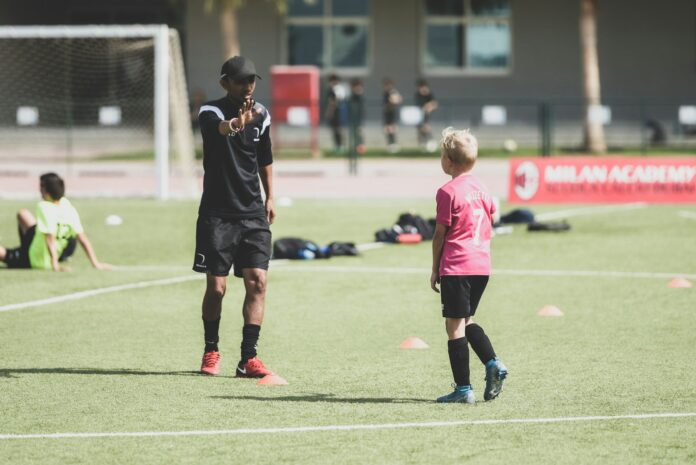Active listening is a critical skill for young athletes, especially in team sports like football, where clear communication and understanding are essential for success. When players actively listen, they not only absorb instructions and strategies more effectively but also develop stronger connections with coaches and teammates. As parents, you have a unique opportunity to help your child cultivate this skill, both on and off the field.
By teaching and modeling active listening, you can empower your young athlete to become more focused, collaborative, and responsive—qualities that will benefit them not just in football, but in every area of their life. Here are practical techniques to encourage active listening and enhance their ability to understand and execute instructions during the game.
Teach the Basics of Active Listening
Active listening starts with giving full attention to the speaker, whether it’s a coach explaining tactics or a teammate sharing ideas. Encourage your child to face the speaker, maintain eye contact, and show they are engaged through nodding or small verbal cues like “Okay” or “I understand.” These simple habits signal respect and help them focus on the message being conveyed.
You can reinforce this skill at home by modeling it yourself. When your child talks about their day or a recent game, put away distractions, listen attentively, and respond thoughtfully. By demonstrating active listening, you set an example they can emulate on the field.
Practice Paraphrasing
A great way to ensure comprehension is by paraphrasing instructions or ideas. Encourage your child to repeat back what they’ve heard in their own words. For example, if a coach says, “Stay on your mark and block their forward,” your child might respond, “So, I need to stick close to my opponent and stop them from advancing, right?” This technique not only confirms their understanding but also helps reinforce the message in their memory.
At home, you can practice this skill during casual conversations. After giving them instructions for a task, ask them to repeat it back. This habit trains them to process and confirm information, making them better prepared to absorb instructions under pressure on the field.
Encourage Questions
Sometimes, young athletes hesitate to ask questions out of fear of seeming unsure or disruptive. However, asking clarifying questions is a vital part of active listening. Remind your child that it’s always okay to ask for more details if they don’t fully understand something. For example, they can say, “Can you explain where I should position myself during that play?” This shows they’re engaged and eager to perform correctly.
You can help normalize asking questions by encouraging curiosity at home. Whether it’s about a new concept at school or a family plan, make it clear that asking questions is a strength, not a weakness. This confidence will translate to better communication on the field.
Focus on the Present Moment
Active listening requires full attention in the present moment, which can be challenging for young players when they’re feeling nervous or distracted during a game. Teach your child techniques like taking a deep breath or repeating a key word silently to themselves (“focus”) to stay centered. When they’re grounded, they’re more likely to process and act on instructions effectively.
You can also practice mindfulness activities together, such as simple breathing exercises or games that encourage focus, like memory challenges. These practices build mental clarity and train them to stay present under pressure.
Strengthen Nonverbal Communication Awareness
Listening is not just about words; it’s also about picking up on nonverbal cues like tone of voice, body language, and gestures. Encourage your child to pay attention to a coach’s demeanor or teammates’ expressions. For example, noticing a teammate’s frustrated gesture might indicate they need support, while a coach’s urgency might signal a critical adjustment.
At home, you can play observation games that teach your child to interpret nonverbal signals. For example, you might ask them to guess how someone is feeling based on their tone or body language in a movie scene. This skill helps them become more attuned to the subtle dynamics of communication on the field.
Reinforce the Importance of Respectful Communication
Active listening isn’t just about understanding instructions; it’s also about fostering respect and teamwork. Teach your child the value of giving their full attention to others, whether it’s a coach, a teammate, or an opponent. Listening respectfully builds trust and shows that they value everyone’s contributions.
When you’re at a game, demonstrate this by listening carefully to coaches or players, even during casual interactions. Your child will pick up on these habits and carry them into their own interactions.
Reflect After the Game
Reflection is an essential part of learning and growth. After a game or practice, take time to ask your child about their listening experience. Questions like, “Did you feel like you understood the coach’s instructions?” or “Was there anything confusing during the game?” encourage them to think critically about their communication skills. This reflection helps them identify areas for improvement and reinforces the importance of active listening.
The Bigger Picture: Building Life Skills Through Football
Active listening isn’t just a skill for football—it’s a life skill that will serve your child in relationships, academics, and future careers. By helping them focus on understanding and responding thoughtfully, you’re teaching them how to collaborate, solve problems, and build meaningful connections with others.
When young athletes learn to listen actively, they become better teammates, stronger players, and more confident individuals. And as parents, your guidance, encouragement, and example are the keys to making that happen. Through your support, your child can unlock the full potential of both their game and their personal growth, one conversation at a time.

